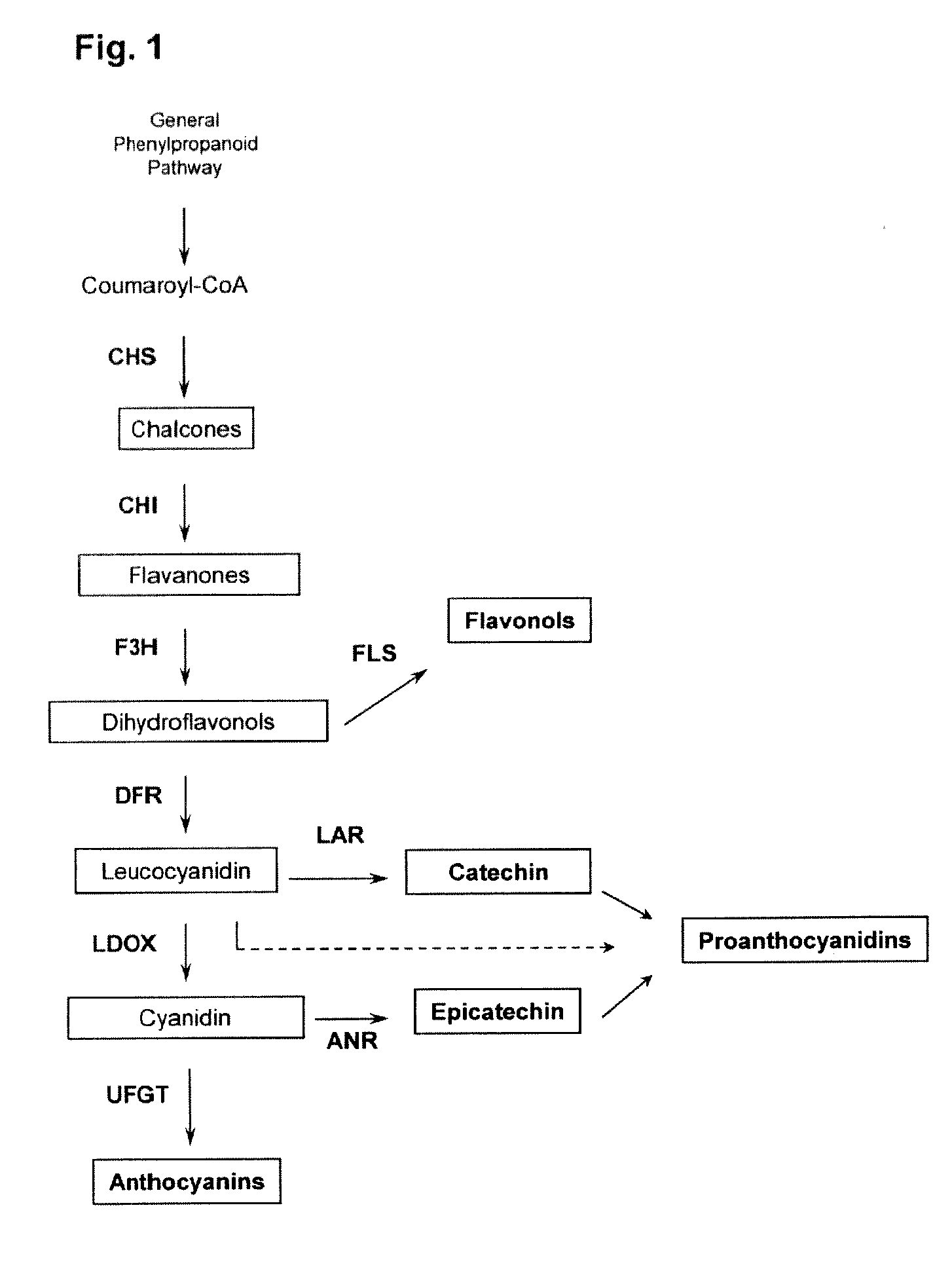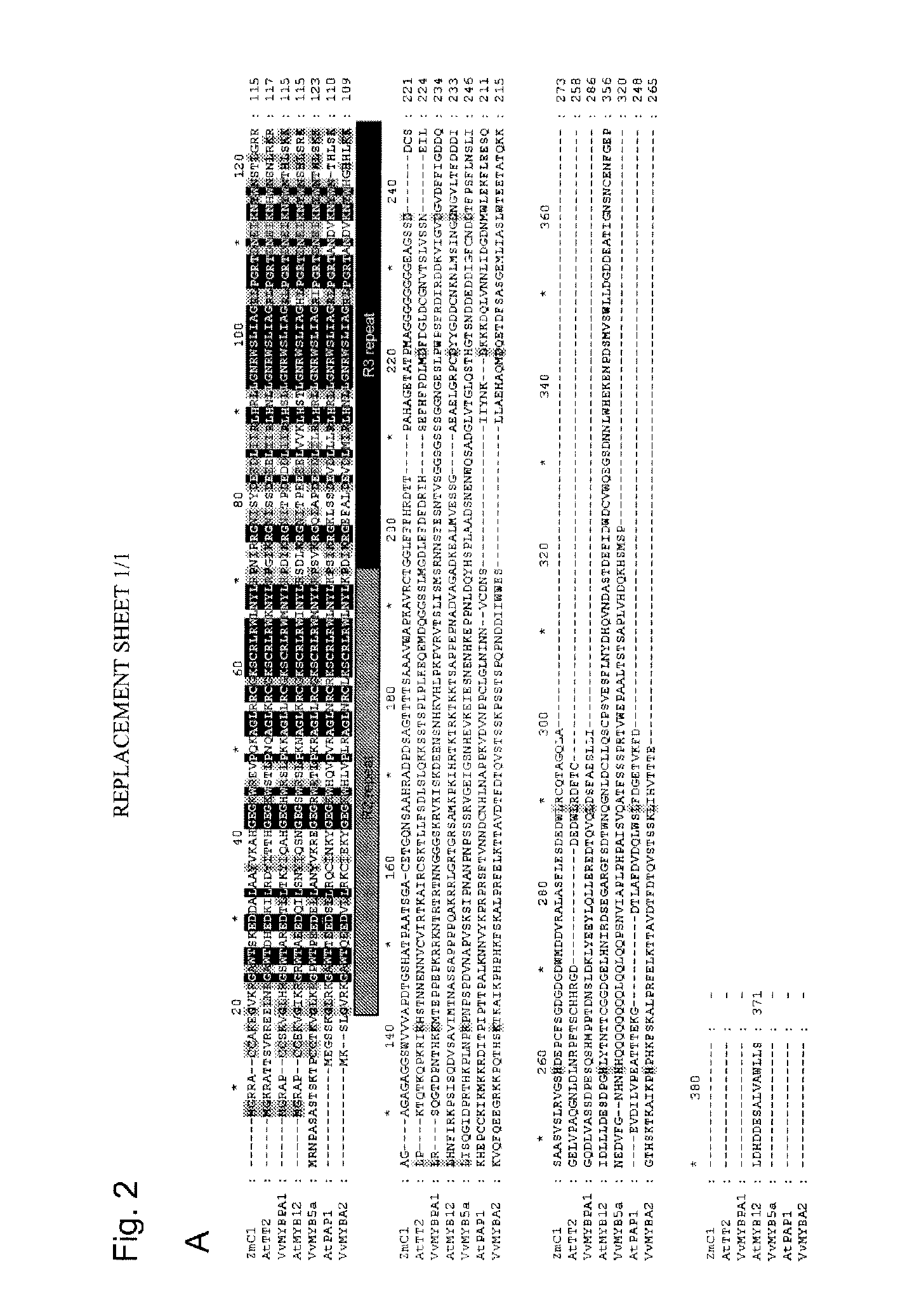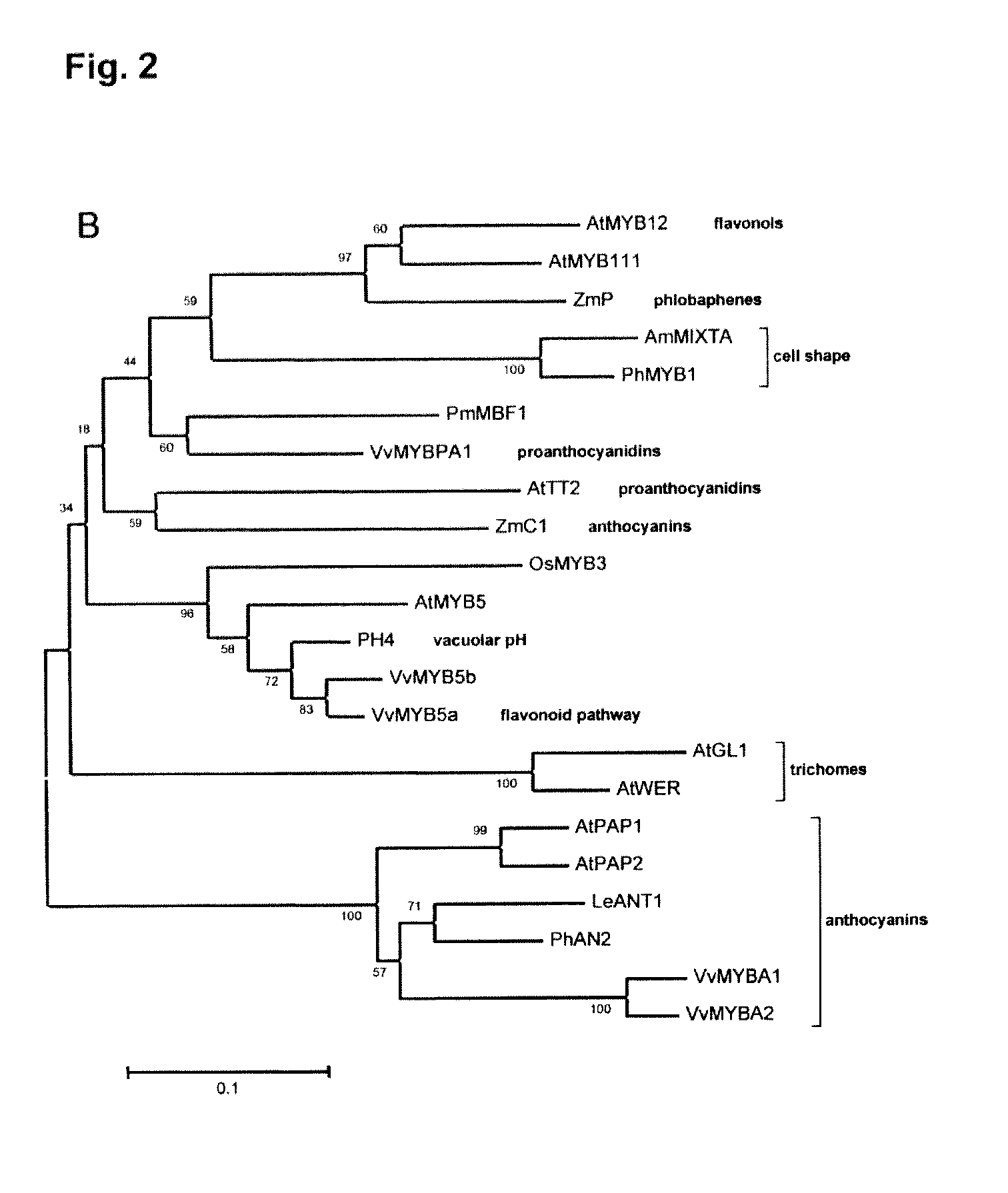Novel gene encoding myb transcription factor involved in proanthocyanidin synthesis
a proanthocyanidin and transcription factor technology, applied in the field of new gene encoding myb transcription factor involved in proanthocyanidin synthesis, can solve the problems of not well characterized specific regulation of pa synthesis in plant species other than i>arabidopsis /i>, and no functional homologue of tt2 has been identified, so as to improve disease- or pest-resistant resistance in animals, improve bloat safety, and increase the efficiency of protein
- Summary
- Abstract
- Description
- Claims
- Application Information
AI Technical Summary
Benefits of technology
Problems solved by technology
Method used
Image
Examples
example 1
Materials and Methods
Plant Material
[0162]Grapevine tissues of Vitis vinifera L. cv. Shiraz were collected from a commercial vineyard during the 2000-2001 season. Approximately 100 berries from at least 20 bunches were collected at weekly intervals throughout berry development from floral initiation until harvest, as described in Downey at al. (2003a). All samples were frozen in liquid nitrogen upon collection in the field and stored at −80° C. until analyzed.
[0163]Arabidopsis thaliana Columbia-0 (Col-0) and tt2 (SALK—005260) seeds were provided by The Arabidopsis Biological Resource Center (Ohio, USA).
Preparation of cDNAs
[0164]Total grapevine RNA was isolated from the various plant tissues as described in Downey et al. (2003b). Arabidopsis RNA was isolated from leaves with RNeasy Kit (Qiagen) following the suppliers protocol. The quality of RNA was verified by demonstration of intact ribosomal bands following agarose gel electrophoresis in addition to the absorbance ratios (A260 / 280...
example 2
Functional Analysis of Grapevine VvMYBPA1 Gene in Tobacco
[0196]To test the function of VvMYBPA1, it was introduced into tobacco under the control of the 35S CaMV promoter.
Methods: Transformation of Tobacco with VvMYBPA1 and Analysis of Flavonoids.
[0197]The full length VvMYBPA1 cDNA was cloned into the vector pART7 (Gleave, 1992) and transformed into tobacco via the pART27 vector under the control of the CaMV 35S promoter. Leaf disks of Nicotiana tabacum (cv.Samsun NN) were used for standard Agrobacterium-mediated transformation according to Horsch et al, 1985.
[0198]Proanthocyanidins (PAs) in transgenic tobacco petals were determined by extracting the petal tissue into 70% acetone with 0.1% ascorbate and quantitating PAs with the dimethylaminocinnamaldehyde (DMACA) reagent described by Nagel and Glories (1991) using catechin (Sigma) as a standard. Anthocyanins and flavonols in transgenic tobacco petal tissues were extracted into methanol / HC as described in Downey at al. (2004). Antho...
example 3
Transformation of White Clover with VvMYBPA1 Gene
[0200]Transformation experiments to introduce the VvMYBPA1 gene are carried out with the white clover cultivars ‘Haifa’ and ‘Waverley’, using a binary transformation plasmid comprising the protein coding region (ORF) of VvMYBPA1 inserted into the binary vector pART27 (Gleave, 1992) where it is under the control of the CaMV 35S promoter. The plant selectable marker is nptII flanked by nos 5′ and nos 3′ sequences (described by An et al., 1985). The binary plasmid is transferred into A. tumefaciens (AGL1) by electroporation. Agrobacterium tumefaciens strain AGL1 carries a disarmed Ti plasmid (Lazo et al., 1991).
White Clover Transformation
[0201]The method of Larkin et al., (1996) is followed. White clover seed is surface sterilised by soaking in 70% (v / v) ethanol for 3 min, 30% (v / v) bleach solution (final 1.5% (w / v) available chlorine) for 40 min, 70% ethanol again for 3 min followed by 6 washes in sterile distilled water over 1 h. These...
PUM
| Property | Measurement | Unit |
|---|---|---|
| temperature | aaaaa | aaaaa |
| temperature | aaaaa | aaaaa |
| temperature | aaaaa | aaaaa |
Abstract
Description
Claims
Application Information
 Login to View More
Login to View More - R&D
- Intellectual Property
- Life Sciences
- Materials
- Tech Scout
- Unparalleled Data Quality
- Higher Quality Content
- 60% Fewer Hallucinations
Browse by: Latest US Patents, China's latest patents, Technical Efficacy Thesaurus, Application Domain, Technology Topic, Popular Technical Reports.
© 2025 PatSnap. All rights reserved.Legal|Privacy policy|Modern Slavery Act Transparency Statement|Sitemap|About US| Contact US: help@patsnap.com



